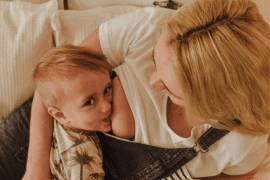By Tracy Cassels
Pardon the lateness, but I admit I was a little busy halfway around the world during this year’s World Breastfeeding Week so it wasn’t until after I returned home that I was subject to seeing a particular piece from Huffington Post UK on the idea of changing World Breastfeeding Week to World Infant Feeding Week.
This is the third year in a row that Ms. Leppard has shared this piece and she has, in other pieces, argued that the angry response to it is exactly why it is needed. We don’t need more divisions, weeks that exclude some groups aren’t successful, it shames those who don’t breastfeed… And so on. The scientist and advocate in me wants to tear this piece apart piece by piece so we can see exactly why this idea is so ill-informed (something I started to do when sharing on Facebook). The person in me wants to sit down with Ms. Leppard, hand her a glass of wine, and ask her about her pain.
Because there is pain and probably a lot of it.
Whenever we take something so personal and try to politicise it, it’s almost always due to pain. Ms. Leppard speaks to some of it in her article and this pain and associated feelings of grief that have come from her own experiences being unable to breastfeed.
This pain is something that has been echoed by millions of women and is one possible reason why some women struggle more with post-partum depression.
The loss of something you wanted to do when you are already emotional and struggling to identify yourself in your new role can just feed fuel to the idea that you won’t be able to define yourself as you’d like in this role. You will forever see yourself as subpar. (This is likely related to the research that has found that although there is an increased incidence of post-partum depression in non-breastfeeding mothers or when a mother stops breastfeeding early [1][2], the increased risk is actually for those who wanted to breastfeed but couldn’t, not in those who never had any intention to[3].)
In our grief, we don’t always see things as they are, and so a public cry to change World Breastfeeding Week can come across as irrational and missing the point entirely to those who are looking at it through a different lens. To those who share that same lens, it’s a cry for people to realise they are triggered and hurting still. This should be no surprise given we live in a society that does not support the experience of grief.
Instead, we try to change the narrative so that what causes us grief isn’t something that we should even be upset about. Or we get angry at those who have succeeded where we did not.
Or we try to remove all mention of what it is that causes us pain so that we never have to face it at all. Or some combination of the above.
Through this lens, Ms. Leppard’s piece makes perfect sense. It tries to change the narrative around grief by dismissing the research on breastfeeding as being flawed, biased, or inconsistent (if it’s not so great to begin with, what do you have to be sad about?). It carries a passive anger towards those that succeeded (you aren’t thinking about others, just yourselves and what you’ve overcome, aren’t you?). And primarily, it wants to remove all mention of what has caused pain (bye World Breastfeeding Week).
What are we to do?
It’s easy to take the scientist route and just look at this response through the lens of the political or public (again, this was my own first reaction), but it’s much harder to find that inner empathy when someone’s grief turns their advocacy into something that threatens. And threatens she does because her proposal is a way to completely negate the very real needs of breastfeeding mothers around the world. When viewed through that lens, it’s easy to feel the need to just rebut everything (especially when the threat is in a public forum).
The problem is that the first route doesn’t necessarily help. Logic is not going to win this one (and there are massive logic flaws in this article) and those who know this are already on the side of keeping World Breastfeeding Week.
For me, this highlights the very real need for us advocates to include grief support in our advocacy.
Many already do on an individual level and they are known as life-savers for so many women who wanted to breastfeed and couldn’t. (They are also the likely reason we have many women who couldn’t breastfeed, but try again, and who join in breastfeeding advocacy despite not having been able to achieve it at some point themselves). But we need more.
I want to put out a few things that I think we need here:
- More research into the type of grief support that works and helps women overcome the loss of breastfeeding.
- Acknowledgment of the real role that unplanned early cessation or lack of breastfeeding has on a mother’s mental health and a discussion of this during pregnancy.
- Grief support in-hospital for women who are struggling to breastfeed and feeling overwhelmed by emotions of fear and/or failure.
- Follow-up support in groups, especially breastfeeding groups, for mothers who wanted to breastfeed but were unable to do so. Being welcomed into the fold of breastfeeding mothers can sometimes mean all the difference to a mother, but only after she has been allowed and supported to feel her own grief at what she has lost.











